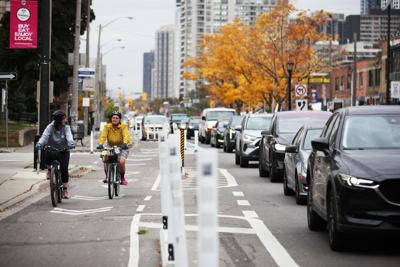Ìý
The big number
22%
the rough percentage of residents in future developments — up for debate at council this week — who will have access to a parking space
When Mayor Olivia Chow and members of º£½ÇÉçÇø¹ÙÍøcouncil get together for their monthly meeting Wednesday, much of the attention will be on the mayor’s Ford-fighting strategy.
Chow has held a spot on the agenda for discussion of how city hall should push back against Bill 212. That’s the legislation put forward by Premier Doug Ford’s government that would, if passed, restrict council’s power to approve bike lanes. It will also enable Queen’s Park to remove lanes already installed on routes like Bloor Street, Yonge Street and University Avenue. Regardless of what you think about bike lanes, it’s an overreach onto city hall’s turf — it needs to defend itself.
So the strategy discussion will be important. But it is truly ridiculous that it’s even necessary. Because there are 31 other items on council’s agenda that highlight just how absurd Ford’s anti-bike lane push really is.
By my count, with these 31 items — a mishmash of various planning reports asking for approval to approve or continue negotiations on various developments — council is set to vote on 15,590 new housing units. Most of them condos. And collectively, those new units will come with just 6,071 new parking spaces.
The math is clear: the vast majority of new homes voted on by council this week won’t have any parking at all. Zip. Zilch. Zero.
The numbers are starker if you think in terms of people, not units. A 2021 city planning report , but let’s assume these new units — which tend to be pretty darn small — will average a bit lower, at 1.75. That still means these units will house about 27,283 people.
And only about 22 per cent of them will have a space to park a car.
I was inspired to add up these numbers after reading a column the writer and advocate Dylan Reid published last month for Spacing .
Consider the context. In 2021, council abolished its previous planning policy that required developers to include a minimum amount of parking in each new development. The motivation was twofold. First, underground parking spaces are enormously expensive — — and only add to the cost of already costly housing in the city.
Second, there’s no conceivable future where º£½ÇÉçÇø¹ÙÍøcan be a functional city where new residents drive as their primary means of transportation. º£½ÇÉçÇø¹ÙÍøcan handle a lot more people. It can’t handle a lot more cars. (To that end, — preventing some developers from building parking spaces even if they want to.)
And so, motivated in part by Ford’s housing targets, º£½ÇÉçÇø¹ÙÍøis approving thousands of new units but not too many new parking spaces. To further make it clear they expect new residents to live car-free, º£½ÇÉçÇø¹ÙÍøcity hall also .
But this isn’t just a º£½ÇÉçÇø¹ÙÍøstrategy. Getting rid of parking requirements in new buildings has been a focus for Ford’s government too. In 2022, Ford’s recommended eliminating parking requirements for any development on a street with transit service, including bus service. Ford’s latest housing bill, passed this spring, took a step toward that and blocked municipalities from requiring parking in developments near transit stations.
This isn’t just a downtown thing, either. Near Bloor and Kipling in the premier’s beloved Etobicoke, city hall’s real estate agency CreateTO , enough for less than 30 per cent of units to come with a space.
Private developers in the area are getting even more aggressive. A plan for boasts 556 units and only 115 spaces. A . And a recently updated plan for .
Yes, these new residents will be close to transit stations and that will help with car-free living. But transit can’t just be the only answer for getting around. Service won’t always be available when you need it. Disruptions happen. Destinations won’t always line up with available routes. Some trips are always better handled by active transportation, like walking or cycling.
The noisy but peaceful protest began with a rally at Christie Pits Park, with cyclists holding up signs saying “bike lanes save lives.”
The noisy but peaceful protest began with a rally at Christie Pits Park, with cyclists holding up signs saying “bike lanes save lives.”
Municipal and provincial housing policy has understood and embraced the fact that cars aren’t and won’t ever again be king. It’s been codified in bylaws and legislation. Ford, though, seems to believe º£½ÇÉçÇø¹ÙÍøshould be designed for cars even as its population of new residents won’t have cars. He’s trying to prevent a future that’s already under construction.
Error! Sorry, there was an error processing your request.
There was a problem with the recaptcha. Please try again.
You may unsubscribe at any time. By signing up, you agree to our and . This site is protected by reCAPTCHA and the Google and apply.
Want more of the latest from us? Sign up for more at our newsletter page.




























To join the conversation set a first and last name in your user profile.
Sign in or register for free to join the Conversation